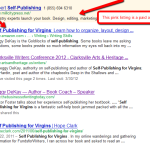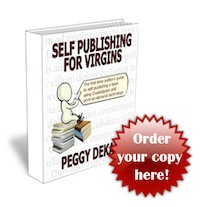
Top 7 Mistakes Indie Authors
If you are a new author, there are things that can help and things that can hurt your book sales. Here are seven of the most common “mistakes” that I have seen authors make. Remember, making a mistake is not the end of the world; it is a lesson, that once learned, makes you a stronger book marketer!
Most of the mistakes I outline here I have made too. (The smartest person in the room is often the one who has made the most mistakes.) The whole point is this—we do not have to make these mistakes to learn, we can learn from the mistakes of others.
1. Pricing Your Book Too High
Pricing your book in the “sweet spot” can improve sales dramatically. In general, e-books by indie authors are cheaper than traditionally published books. There is nothing wrong with that. Pricing for first-time authors should be aggressive. As a new author, you are looking to build a following and generate sales. This means a lower list price. I have found that the sweet spot for most indie authors in the e-book arena is between $2.99 and $6.99 while most traditionally published books are prices between $9.99 and $14.99. To determine where your “best price” might be, study other books in your genre with a similar topic, theme and page count then price your book a little lower than theirs to spur sales.
2. Categories the Wrong Category
Always make sure that the “category” you choose on Amazon Kindle is not the most competitive category in the genre. For example, if your book is a book on horror but the bestselling book in the horror category is Stephen Kings’ It, you may have to sell thousands of books to become a bestseller in your category. You would be better off placing your book in the “occult” or the “paranormal” category. The lower the competition in your category, the fewer books you will need to sell to become an Amazon Best Seller in your category.
3. Not Using Keywords in Your Book Title
Using keywords in a book title gives you more “Google juice.” Google, the largest search engine on the Internet, and Amazon, the largest reseller on the Internet “synergize” search results. Suppose you have written a book about how to train your cat. I did a keyword search in Google AdWords Keyword Planner. The search term with the highest returns and lowest competition is “how to train a cat.” It has 9,500 global searches. The best title for your book, according to this search, may be Training a Cat. Why? It has medium competition but high searches. The medium competition means if you choose to do Google advertising on this title the key words will be cheaper than a word or phrase with “high” competition. When someone types in “training a cat” on Google’s search bar, your book on Amazon will most likely appear in the search results. See the screen below on similar search.

4. Not Having an Author Website
Not having a website is a critical error. To market your book, you must have a credible author website. The website is also an effective way to book speaking events, book signings, grow your platform through frequent blog posts or vlogs, promote your brand and communicate with readers.
5. Not Having a Marketing Plan
You must plan your marketing the way you would plan a trip or a vacation. The best marketing plan will outline the next six months of activities such as blog posts, social media postings, signings, book fair, conferences, library appearances, and radio or television appearances. Plan 3 to 6 months in advance for the best results.
6. Using a Bad Book Cover
Your book cover is your receptionist. It is the first thing your reader will encounter before reading your book. It is often the decision breaker if it is a bad cover or the decision maker, if the cover intrigues. Make sure a professional does the cover. The best covers tell the reader something about the book. (I will do a future post on book covers.)
7. Not Hiring a Professional Editor
Two places where you should always be willing to spend top dollar on your book are when acquiring a professional book cover and hiring a professional editor. Poor editing makes a bad book worse or a great book less than it could have been. Great editing can make a solid read.
Peggy DeKay, Speaker, Author, Book Coach
www.PeggyDeKay.com
Peggy@tbowt.com
 Peggy DeKay
Peggy DeKay
 Peggy DeKay
Peggy DeKay




